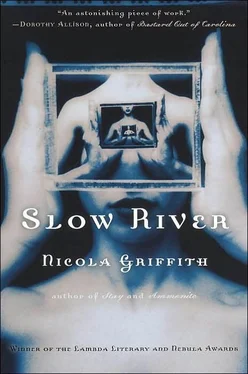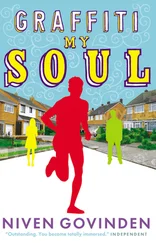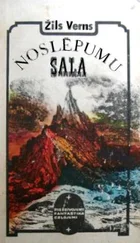“Taking us off.” My board went blank. She started stripping down the screen, unhooking the box.
I found I was kneeling on the floor, stowing things in the backpack without knowing how I got there.
“Nearly twelve seconds,” she was saying.
“Cut the account,” I said.
“Money’s still coming in—”
“Cut it!” I didn’t care how much or how little we had. We needed to cut and run. A nanosecond could make a difference to a security program.
She touched a key, pulled a lead free. “All closed down.”
And then we were standing outside in the rain, pulling the door closed, leaning against the wall, laughing. The rain ran in my ears, my mouth, down my neck, but I didn’t care. We should be running, but I didn’t care. Adrenaline exhilaration could do that. I laughed and laughed: we were free, safe. I had forgotten how sweet it felt to operate outside the law, how good, how big it made me feel…
Reluctantly, I pushed myself away from the wall. “We have to hurry.”
“They didn’t trace us.” But she was already sobering, looking from left to right. Information technology and its finer points did not matter much to the crocodile brain. It wanted some physical distance. We hurried.
I started to feel safe when we were about a quarter of a mile away. I slowed, stopped, started stripping off the plasthene protection. Spanner followed suit. “How much did we make?”
She grinned. “Guess.”
“A lot.” I started to fizz again. A lot of money. For a few minutes’ work. “Tell me.”
“A hundred and four, maybe a hundred and five thousand.”
I laughed out loud, incredulous.
“Shut your mouth,” Spanner said, “you might drown in this rain.”
I was suddenly glad of the rain, glad to be getting wet. It was real. All that money. I felt dizzy. It made a mockery of what I earned at Hedon Road.
The Polar Bear was quiet, only half a dozen people in the place. Spanner had ordered us whiskey. I rolled the glass around in my hands, content to sniff at the fumes. Spanner was on her third drink in thirty minutes. She probably should not be drinking at all with the painkillers she was on. Now that the adrenaline high was fading, I was too tired to care.
“So, what will you do with your share?”
“I don’t know.” I sipped, enjoying the hot, smoky taste. After taking out start-up expenses and paying Tom his share, I’d have more than thirty thousand, tax free. I could drink this stuff every day. Live in a bigger apartment. For a while. “Maybe I’ll give it to someone.” Magyar might be willing to get Paolo’s address from the records. I tried to imagine his expression when he found he was thirty thousand richer. I stared into my glass. Such a warm, welcoming color.
Spanner reached over and covered the glass with her hand. “Who?”
“What?”
“Who are you giving it to?”
Giving the money to Paolo was a stupid fantasy. It wouldn’t help him or me. But I needed to talk—and who was there but Spanner? So I told her about Paolo. About him coming to Hedon Road, about his youth, his strangeness. About his eyes, the way they seemed to open when he realized I wasn’t mocking him, that I would teach him. How young he was, and vulnerable. How he had tried to kill himself. How I felt guilty.
She sipped at her drink. “You didn’t exactly cut off his arms and legs with an axe.”
“No. But I should have done something when I could. So should my father, my mother. Willem. Everybody.” I wanted her to see, to understand. I told her about the hotel room, the judgment in the Caracas case. How, when I had heard, I had shrugged in my air-conditioned hotel room and climbed back in the shower. “But how could I have known then, when I was only sixteen?” They had just been pictures on the screen. Somewhere inside I had thought the dirt on their faces to be makeup, their anguish an act.
But Spanner wasn’t listening. “Money means so little to you that you can afford to just give it away?”
“It’s not the money.”
“Of course it’s the money!” What else is there? She was scared, I realized suddenly. Money was all she had. If I didn’t think much of that, what would I think of her?
“Spanner…”
But she was almost hissing. “You make me sick, you know that? You’re an arrogant bastard. You think the world cares what you feel. You think you can make a difference, but you can’t.”
I had never seen her scared before. It made me uneasy. Something had changed. It had always been the other way around. But I wasn’t afraid anymore. She could not make me do anything I didn’t want to do, ever again. She had rescued me, and taught me to stay alive, but I had paid and paid and paid. I had paid enough.
I think she saw that, and I think it frightened her even more. I wanted to explain to her that I wouldn’t hurt her, that I wasn’t like everyone else she knew, but I didn’t know what to say—and I wasn’t sure if it was true.
She saw my indecision. “Poor little rich girl!”
“No.” I was too tired for this. I finished my drink and stood up.
“Not anymore. I work for my living. I work hard. I do a good job. It means something.”
“Shoveling shit means something?”
“What does your job mean?” I was suddenly blazingly angry: with her, with the world that had shaped her, at myself and all the things I had done or neglected to do.
“What does it mean to you that people pay to use you like a disposable tissue? Does the money make you feel good, worthwhile, even when you can’t move because of the pain and you’re all alone because you don’t have any friends? Does it make you feel good that you might have died if this poor little rich girl hadn’t decided to take pity on you? Does it make you feel good when you wake up in the morning hating yourself because of the things you did to make a quick hundred? Does it?”
I have never seen a snake in the second before it strikes, but I think I know how it would look. It would move its head back a fraction of an inch, it would close its nictitating membranes partway, and the sunlight would slide across hard gray fangs, dry as ancient bone. And then its expression would go blank as all the muscles but those it would use to strike, to drive the venom home into soft mammalian tissue, relaxed.
But then Spanner just picked up her drink, tossed it back, and smiled.
Lore is eighteen. It is her birthday, or it might be. She is sitting in a tent erected inside some kind of warehouse, or maybe it’s a barn. The smells are certainly rural rather than urban: wine and garlic and oil, the occasional hint of grass too long in the sun. The Mediterranean, perhaps, or the South of France. She wonders how they got her here from the resort; she remembers nothing after the two men drugging her in the room.
She has been inside the tent for nearly three weeks, as far as she can tell. They keep her sedated. To begin with, they put it in her food, but because she does not always eat everything, they keep getting the dose wrong. One time, they gave her so much that she slept for over two days, or so they said. Now, though, her system is so saturated that they simply hand her a pill and stand over her while she puts it meekly in her mouth and swallows. But she thinks it is probably her birthday.
The tent is empty but for a sleeping bag and a bucket.
The bucket is emptied every twelve hours. Sometimes the tent stinks. She is humiliated. She is kept naked though not, she is sure, through prurience.
There are two men; one, the taller, wears clothes that always seem to smell of something frying, like fish; the other, shorter than Lore, moves fast and slightly sideways, like a crab. When they bring her food trays or empty her bucket or hand her the pills, both wear gloves, and hoods like ski masks. She has no idea what they look like, of their race or age, but she feels she could tell them apart even without the height discrepancy. The tall one, whom she thinks of as Fishface, seems nice.
Читать дальше












